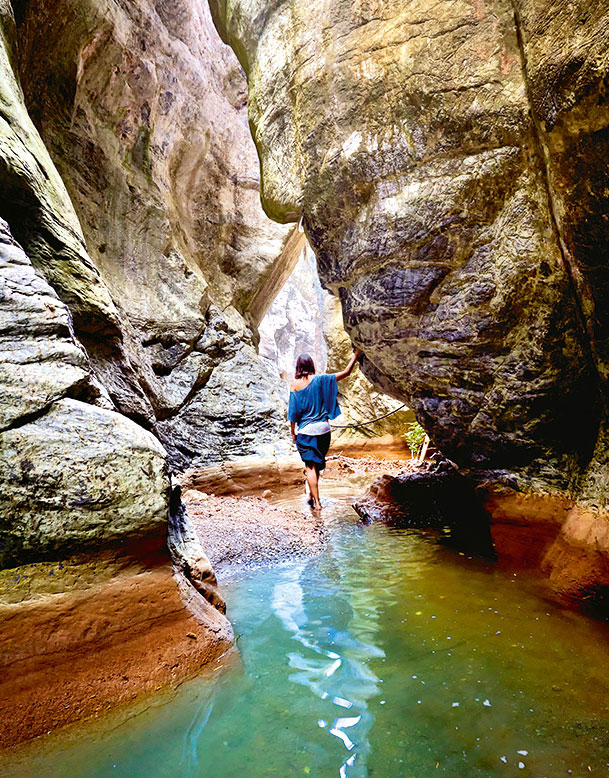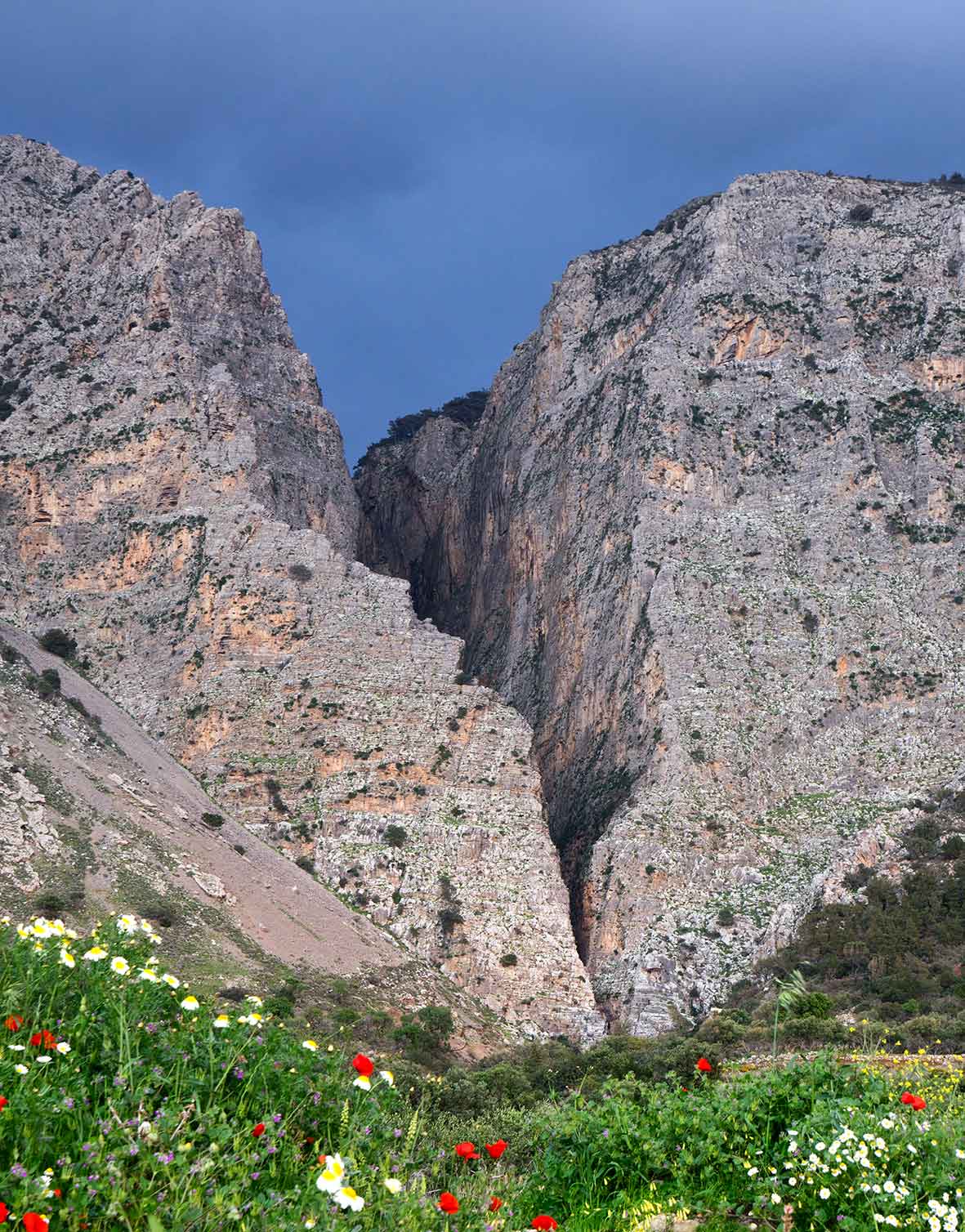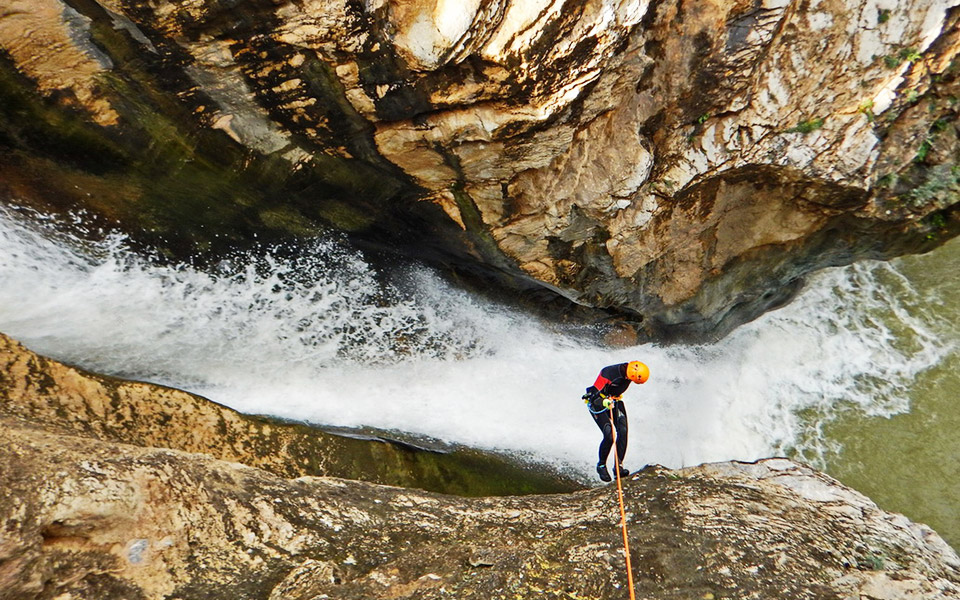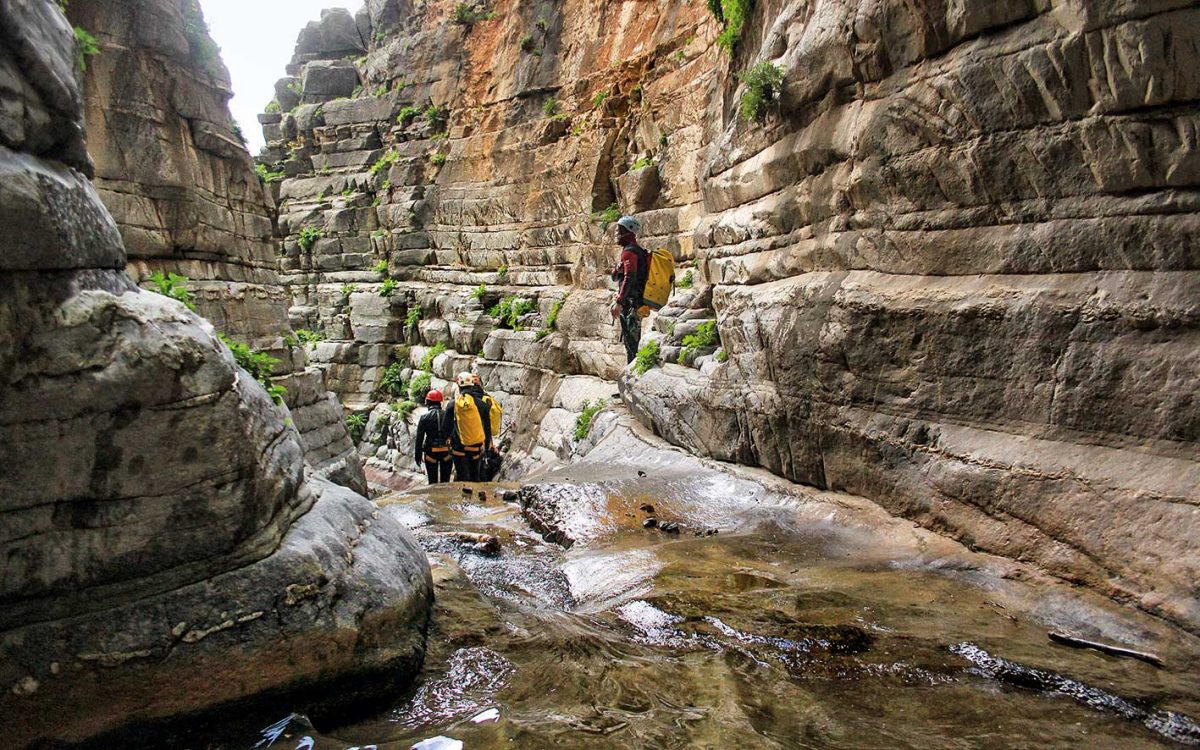“If you ask a Cretan where the largest waterfall in Greece is located, he will tell you it’s in Edessa. He won’t know that it’s in Hania, in the Perdika Gorge, and that it’s 240 meters high. From this, you can understand that the average Cretan does not know the beauty that exists in his very home.” Yiannis Bromirakis certainly definitely knows, however. An instructor and the president of the Cretan Canyoning Association (CCA), with 15 years of experience in canyoning, he has made around 1,500 crossings in 27 countries.
“Crete has over 250 hiking and ‘technical’ gorges. We deal mainly with the second category; in other words, canyons that require ropes and equipment, which we estimate there are 90 of. The most important, most beautiful and most popularly visited are in the prefecture of Lasithi and in southern Irakleio. The Lasithi mountains are on the southern side of the Lasithi Plateau, which is also the largest water supplier for the gorges that attract the most interest.”
For the average person who isn’t much of a sports whiz, what is canyoning exactly? “Canyoning is crossing a canyon with water in it. In Crete, we don’t have water all year round – nor every year, which is why the canyons are usually suitable for canyoning for two or three months, from January to March.”

© Perikles Merakos

© Shutterstock
During periods when the canyons don’t have water in them, fans of the sport can rappel (climbing with ropes) down them. A canyon can be crossed by people of any age who are in relatively good physical condition. “From 8 to 65 years old. Certainly, of course, canyoning is for people who are healthy and happy to expose themselves to heights.”
Although in recent years, nature and adventure tourism – which includes canyoning – has become increasingly popular, it has not yet reached the point of making any substantial contribution to changing the island’s tourist profile. “Essentially, yes, this type of activity helps. But if you consider that a few million tourists arrive in Crete annually, booking themselves into a hotel, eating, drinking, sunbathing and then leaving, the percentage of people who look further inland and are truly interested in such activities is minute. Probably only around 400 a year. Then again compared to the past, when there was no interest at all, that’s still a significant improvement.”
Listening to Yiannis talk about the Cretan gorges and describe his experiences in them, you realize he’s referring to a world that has nothing to do with the Crete of beaches most of us know. “The first few times I opened routes and entered certain gorges, I felt giddy for a month,” he recalls. “What I saw was so extraordinary.”

© canyon.gr
It’s worth building up the courage to attempt it. To see rushing waterfalls, dive into ice cold lakes, walk through mountain crevasses between their high walls and swing on ropes off vertical cliffs and observe amazing birds flying overhead. “Those are vultures. We meet them very often; in a way, they’re our fellow travelers. There’s no way they can get too close because they’re afraid. But they watch.”
The man who shudders at the idea of hanging from a rock while a wild bird hovers a hundred meters above his head, watching his every movement, is the one who should try canyoning. Because if there’s one thing you can gain from this sport, it’s facing your fears. “You have to believe in yourself and say ‘I can!’ To find yourself alone, ‘naked’ and exposed and try to push your limits. To see that you are finally something greater than you thought you were. In most cases, a healthy person treats canyoning as a self-confidence injection that gives them the right boost for facing work on Monday, sticking resiliently to their schedule and routine, without being chipped away at by daily life.”
Notable Gorges (listed by degree of difficulty)
Panagia, Irakleio
A narrow and dense canyon, 1,2 km long, with carob trees, cypresses and pepper trees. The largest waterfall has a 15-meter drop.
Difficulty grade: 2 out of 6.
Descent time: 2 hours.
Starting point: Below the village of Kalami.
Finish point: At Panagia Keralimeniotissa.
Volaha, Irakleio
A wider gorge than the previous one, 2.8 kilometers long, with pine trees and bigger waterfalls.
Difficulty grade: 3 out of 6.
Descent time: 3 1/2 hours.
Starting point: south of the village of Kapetaniana.
Finish point: at the Ai Giannis village.
Portela, Irakleio
A separate gorge, 3.5 kilometers long, with younger limestone rocks that are quite soft, which is why the water takes on a slightly white tint.
Difficulty grade: 4,5 out of 6.
Descent time: 5-6 hours.
Starting point: village of Chondros.
Finish point: Kastri village.
Ha, Lasithi
The Ha Gorge is the most unique gorge in Crete, with 27 waterfalls and vertical walls 400 m high.
A very special, 1,6 km long gorge with clear waters and 27 waterfalls. Its vertical walls reach a height of 400 meters. It is narrow, with a maximum width of 6-7 m and a minimum of 40 centimeters. In case of an emergency, you cannot leave any part of the route but must reach its end.
Difficulty grade: 4,5 out of 6.
Descent time: 4 hours.
Starting point: From a point south of Thrypti.
Finish point: Monastiraki village.
Arvi, Irakleio
A rare gorge, 1.7 kilometers long, with a 200-meter-long dark passing. The gap between the walls closes at some point and you need a torch to pass. This phenomenon occurs in about 100 gorges around the world and Arvi is the most notable Greek gorge of this type.
Difficulty grade: 5/5.5 to 6.
Descent time: 2 1/2 to 3 hours.
Starting point: South of the village of Amiras.
Finish point: Arvi village.












